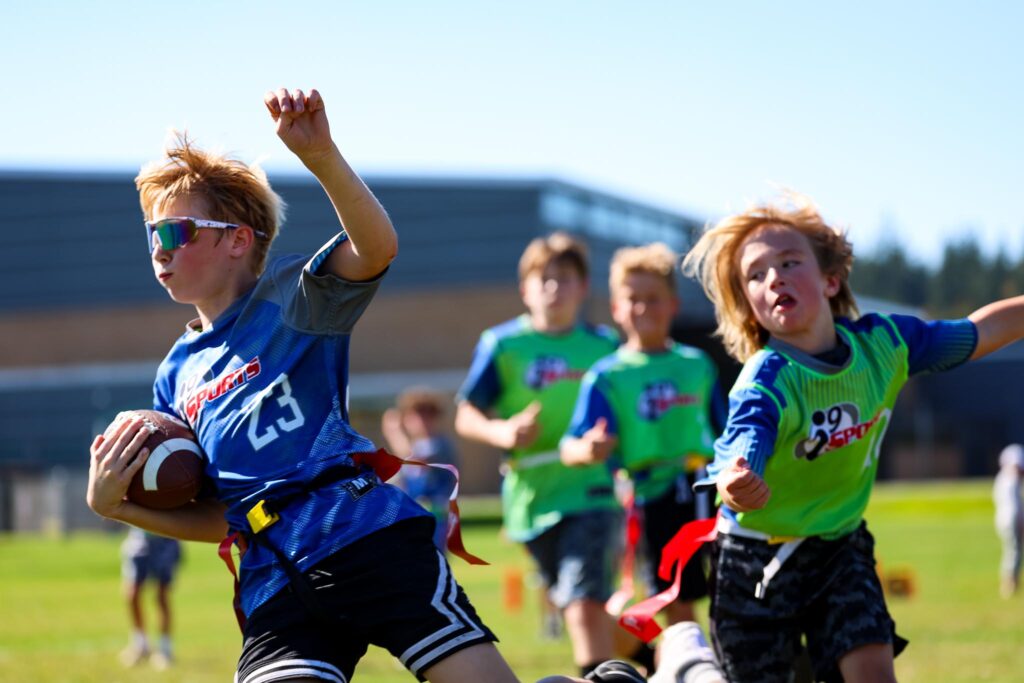What to Expect Playing Flag Football
With the rise of flag football’s popularity on the global stage, many parents are rethinking their approach to youth football. Flag football is set to become part of the 2028 L.A. Olympic Games and local leagues and school teams continue to be added in areas nationwide. So what can parents and players expect when signing up for this new popular sport?
Flag Football is Beneficial for All Ages
The most obvious difference you will see In flag football is that there is no tackling. Instead, players stop the ball carrier by pulling flags attached to their waists. This is typically the selling point for parents, especially parents of younger children.
However, with flag football teams for middle school and high school students becoming more popular and more widely available, your kids have more options to play flag football long-term. Flag football is a great way for kids of all ages to learn teamwork, speed, and agility among other developmental skills.
Age and Skill Development
Flag football emphasizes agility, speed, and quick decision-making. Players focus on ball-handling skills, running routes, and understanding offensive and defensive plays.
Flag football coaches often focus on refining the basics of passing, route running, and positioning, as the game leans heavily on speed and precision. Without contact, coaches can emphasize strategic play and awareness of space on the field.
Game Rules
You may notice a few important differences in the gameplay compared to traditional football. Below are some of the rule differences you may notice. Keep in mind that these rules can also vary slightly based on age groups and locations. Younger players, especially those from ages 3-7, will typically have slight variations in these differences to help speed up gameplay while they’re still learning the basics.
Flag Football Rules That Differ From Traditional Football
- Teams are smaller.
- For younger teams, you will see 4-5 players on a field at one time.
- Older teams you will see up to 7 players on a field.
- Blocking is not allowed in flag football.
- The ball is spotted based on where the carrier’s feet are when the flag is pulled, not where the ball is.
- There are no fumble returns. If the ball carrier fumbles, the ball is spotted where it hits the ground.
- All players are eligible to receive a pass.
- No-run zones are implemented at some levels where teams cannot run the ball in certain spots on the field such as the 5 yards prior to the end zone.
- Scoring is slightly different:
- Touchdown= 6 points
- Extra Point= 1 point
- Extra points are not kicked.
- It is a play from the 5-yard line. Typically has to be a pass play for older age groups.
- You can go for two extra points by playing from the 12-yard line
- Safety=2 points
- Extra Point Attempt Return= 2 points
- This is when a pass for an extra point is intercepted and returned for a touchdown.
- Teams are smaller.
Despite the slight differences in how the game is played, flag football is still the exciting sport kids love to watch with mom and dad on Sundays. It’s a great way for them to stay active, enjoy the game, and continue to develop a love for sports overall.
Find a Flag Football Program Near You
Our youth flag football program has been around for 20 years and is our most popular sport. We focus on teaching age-appropriate instruction and sportsmanship. This allows young athletes to learn the game, improve their skills, and fall in love with the sport. Find a flag football program near you today!
About the Author

Tyler Munoz
Manager Of Sport, i9 Sports®
Tyler is responsible for creating and implementing national training programs for coaches and over 240 franchisees to achieve the company’s mission to help kids succeed in life through sports.
Tyler grew up in Modesto, California, playing baseball, basketball and football from the age of 5. Sports have always been at the center of his life and have been something that he has dedicated his life to making a positive impact in.
He discovered his passion - supporting coaches to ensure they can provide a quality sport experience to the athletes that they coach during his education at California State University, Fresno. He earned his Master of Arts in Kinesiology – Sport Psychology and his Bachelor of Arts in Political Science with a Minor in Sport Coaching from California State University, Fresno.
After graduating, Tyler spent a year in New Zealand and Australia, where he studied and participated in the two countries’ sport environments, athlete development systems, and coaching models.
After his travels, he joined the United States Olympic and Paralympic Committee’s (USOPC) Coaching Education Department as the American Development Model and Youth Development fellow. Tyler was able to collaborate and coordinate sport development projects with several National Governing Bodies and assist the Coaching Education team with creating and updating resources related to coach training and the American Development Model.
Tyler continued to consult with the USOPC on initiatives related to the American Development Model the Quality Coaching Framework and ultimately, developed an online course, Foundations of the American Development Model. In 2020, he accepted a position with USA Football as the Senior Manager of Coach Education.
During his three years there, he was able to redesign the organization’s coach education certification, which led to USA Football achieving its’ one millionth coach certification in 2022. Tyler has coached football, baseball, and basketball at all levels of sport (recreational, scholastic, national, and international) throughout his life and is passionate about giving back to the communities in which he has lived.
Presentations and Awards:
College of Health and Human Services- Outstanding Project Award
Presented graduate project at the 39th Annual Central California Research Symposium
Olympic & Paralympic Coach Magazine Spring 2020- ADM & Me: Insights in Learning from my USOPC Fellowship
Presented at the USA Football National Conference 2020
Presented at the National Post Olympic and Paralympic Conference of Sport & Science at the Wingate Institute in Israel
What Does Fun Look Like? - Interview with Athlete Era
